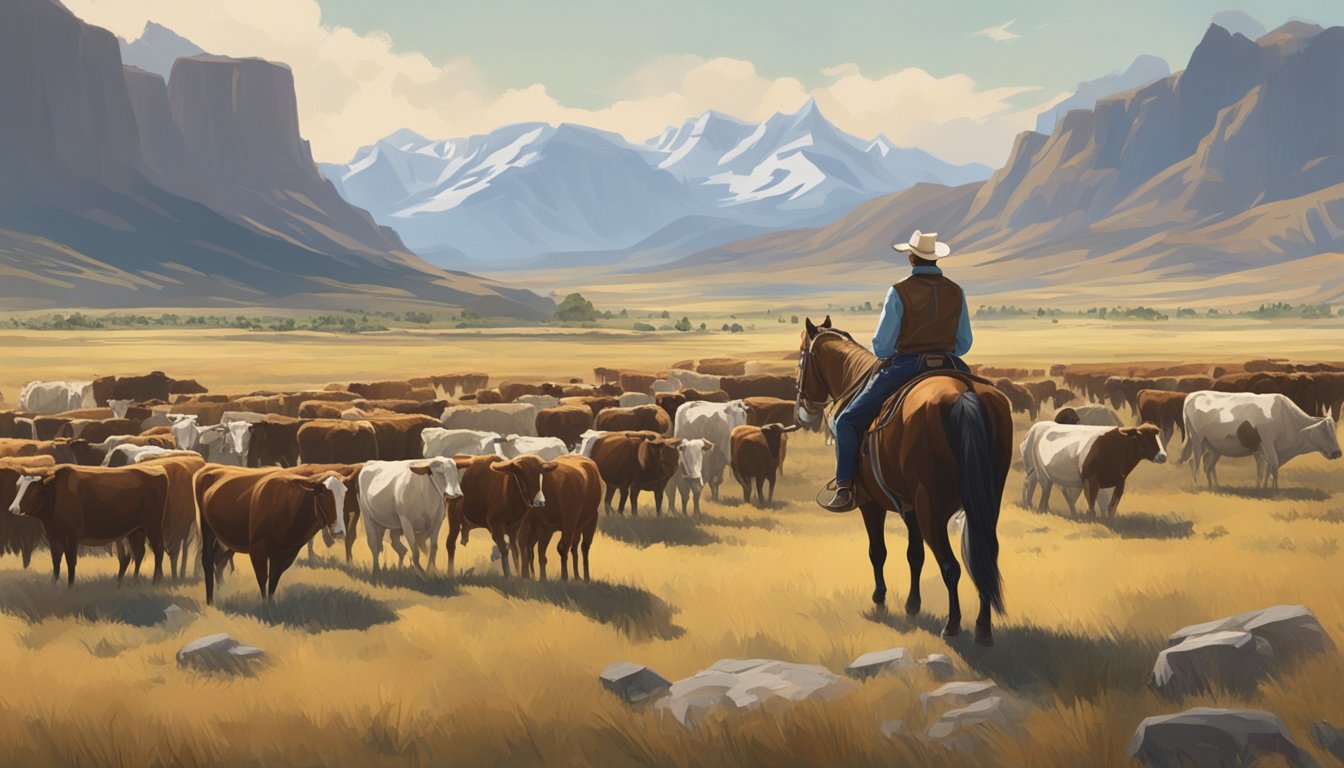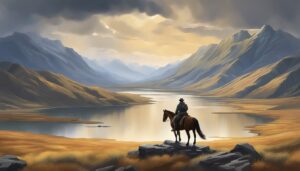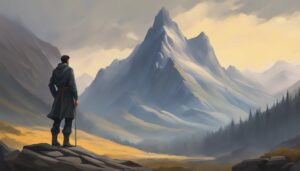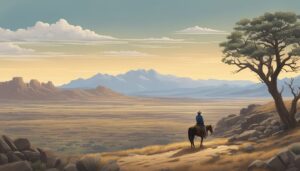Western heroes have captivated audiences for generations, embodying rugged individualism and frontier justice. Two iconic figures that stand out are Yellowstone’s John Dutton and Maverick’s Bart Maverick. These characters, while from different eras of television, represent contrasting approaches to the Western archetype.
John Dutton, portrayed by Kevin Costner, is the patriarch of the largest contiguous ranch in the United States. He’s a complex character, driven by a fierce determination to protect his family’s legacy. John Dutton’s impressive qualities lie in his unwavering resolve and ability to navigate the harsh realities of modern ranching and politics. His character embodies the evolution of the Western hero in contemporary settings.
Bart Maverick, played by James Garner in the classic TV series, offers a different take on the Western protagonist. Known for his wit, charm, and gambling skills, Maverick represents a more lighthearted approach to the genre. His ability to outsmart opponents and avoid violence when possible sets him apart from the typical gun-slinging cowboy.
Unfolding the Western Genre: Context and Legacy

The Western genre has evolved significantly, blending traditional elements with contemporary themes. This evolution reflects changing cultural values and audience expectations.
Roots of the Modern Western
The modern Western, or neo-Western, emerged as a response to shifting societal norms. It retains iconic elements like rugged landscapes and frontier justice but incorporates current issues. Films like “Unforgiven” (1992) paved the way, challenging traditional hero narratives.
Television series followed suit. “Deadwood” (2004-2006) showcased morally ambiguous characters in a historically accurate setting. This trend continued with shows like “Hell on Wheels” (2011-2016), which explored complex themes of progress and cultural conflict.
Evolution of the Western Hero Archetype
Traditional Western heroes were often straightforward, embodying clear moral values. Modern Westerns present more nuanced protagonists. These characters grapple with ethical dilemmas and personal flaws.
“Justified” (2010-2015) featured a lawman whose methods often crossed ethical lines. “Longmire” (2012-2017) depicted a sheriff balancing traditional values with modern policing challenges.
This shift allows for deeper character exploration. Heroes now face internal struggles alongside external threats. Their decisions carry weight, often blurring the line between right and wrong.
Character Profiles: John Dutton and Bart Maverick

John Dutton and Bart Maverick represent two distinct archetypes of Western heroes. These characters embody different aspects of the American frontier spirit, each with their own unique motivations and methods.
John Dutton: The Patriarch of the Yellowstone Ranch
John Dutton, portrayed by Kevin Costner in the TV series Yellowstone, is the formidable owner of the largest contiguous ranch in Montana. His character is deeply rooted in the land and family legacy.
As the Livestock Commissioner, John wields significant influence in the region. He fiercely protects his vast Yellowstone Dutton Ranch from threats, both external and internal.
John’s leadership style is often ruthless, driven by his unwavering commitment to preserve his family’s heritage. His complex relationships with his children add depth to his character, revealing both his strength and vulnerabilities.
The challenges of modern ranch life in Montana shape John’s actions. He navigates political pressures, land disputes, and family conflicts with a mix of cunning and brute force.
Bart Maverick: The Charismatic Gambler
Bart Maverick, a protagonist in the classic TV series Maverick, presents a stark contrast to John Dutton’s stern rancher persona. Bart is a smooth-talking, quick-witted gambler who roams the Wild West.
Unlike Dutton’s ties to the land, Maverick’s home is wherever the next poker game takes him. His charm and intelligence are his primary weapons, often allowing him to outsmart his opponents without resorting to violence.
Bart’s adventures typically involve high-stakes card games, con artists, and colorful characters. His moral code, while flexible, generally leads him to help those in need, albeit often reluctantly.
Maverick’s aversion to hard work and preference for easy money set him apart from the typical Western hero. His wit and humor bring a lighter touch to the genre, offering a different take on frontier life.
Narratives and Themes

Westerns captivate audiences through compelling narratives and themes that explore the complexities of human nature and society. John Dutton and Bart Maverick embody different aspects of the Western hero archetype, each navigating unique challenges and moral dilemmas.
Conflict and Power Struggles
In Yellowstone, John Dutton faces constant threats to his ranch and way of life. Land developers, government agencies, and rival ranchers create a web of conflicts. Dutton’s power stems from his vast landholdings and political connections.
Bart Maverick, on the other hand, encounters localized conflicts in his travels. His power lies in his wit, charm, and gambling skills. Maverick often outsmarts his opponents rather than relying on brute force or wealth.
Both characters must navigate complex power dynamics, but their approaches differ significantly. Dutton’s struggles are deeply rooted in the land and family legacy, while Maverick’s conflicts are more transient and personal.
Survival, Tradition, and Change
John Dutton fiercely defends his ranch against modernization and outside influences. His character embodies the struggle between preserving tradition and adapting to change. The Dutton family’s survival is intrinsically linked to their land and way of life.
Bart Maverick, in contrast, represents a more flexible approach to survival. He adapts to new situations and towns, using his skills to thrive in various environments. Maverick’s character challenges traditional Western values by prioritizing individual freedom over settling down.
This contrast highlights different perspectives on the American West – one rooted in place and tradition, the other in mobility and adaptability.
Family Dynamics and Loyalty
The Dutton family in Yellowstone showcases complex relationships and unwavering loyalty. John Dutton’s leadership style and expectations shape his children’s lives and choices. Family loyalty often conflicts with personal desires and moral considerations.
Bart Maverick’s family dynamics are less central to his story. His loyalty lies more with his brother Bret and their shared profession. Maverick’s independence allows for more fluid relationships and alliances.
These differing approaches to family and loyalty reflect broader themes in Western narratives – the tension between individualism and community, freedom and responsibility.
Maverick Vs. Dutton: A Comparative Analysis
John Dutton and Bart Maverick represent contrasting visions of the Western hero. Dutton embodies the rugged, land-tied rancher fighting to preserve a way of life. Maverick portrays the clever, nomadic gambler who thrives on wit and adaptability.
Dutton’s narrative focuses on legacy, power, and the burden of responsibility. Maverick’s story emphasizes personal freedom, cunning, and living by one’s wits. Both characters face moral dilemmas but approach them differently.
Their contrasting narratives highlight the diversity within Western storytelling. Dutton’s tale is one of grit and determination in the face of change, while Maverick’s adventures showcase the excitement and unpredictability of the frontier spirit.
Cultural Impact and Audience Reception

Yellowstone and Maverick have left distinct marks on American television and popular culture. Their portrayals of Western heroes have shaped audience perceptions and influenced media representation of the American West.
The Dutton Family’s Influence on Popular Culture
Yellowstone’s Dutton family has become a cultural touchstone. The show’s popularity has sparked fashion trends, with viewers emulating the characters’ Western-inspired attire. John Dutton’s iconic cowboy hat and rugged style have become particularly sought-after.
Tourism to Montana has surged as fans seek to experience the landscapes depicted in the series. The show’s success has also led to merchandise lines featuring quotes and imagery from Yellowstone.
Taylor Sheridan’s creation has reignited interest in modern Western dramas, influencing television programming and storytelling. The series’ exploration of land rights, family dynamics, and power struggles resonates with audiences across the United States.
Representation of the West in Modern Media
Yellowstone offers a nuanced portrayal of the contemporary American West. The show tackles complex issues facing ranchers, Native American tribes, and local communities. It highlights conflicts over land use, resource management, and cultural preservation.
The series provides representation for Native American characters, exploring their struggles and perspectives. This portrayal has sparked discussions about accurate cultural representation in media.
Maverick, in contrast, presented a more romanticized version of the Old West. Its lighter tone and focus on gambling adventures offered escapism to viewers. The show’s charm and wit made it a beloved classic, shaping perceptions of Western heroes for generations.
Both series have contributed to evolving representations of the West in media, reflecting changing societal values and interests over time.
Creative Minds Behind the Scenes

Taylor Sheridan‘s creative vision and the development of John Dutton as an iconic Western character have been crucial to Yellowstone’s success. The show’s production team has crafted a compelling modern Western drama that resonates with audiences.
Taylor Sheridan’s Western Vision
Taylor Sheridan, the creator of Yellowstone, has brought a fresh perspective to the Western genre. His writing and directing style blend traditional Western themes with contemporary issues. Sheridan’s background as an actor has informed his approach to character development.
The show’s attention to detail in portraying ranch life adds authenticity. Sheridan has insisted on filming on location in Montana, using real working ranches as backdrops. This commitment to realism has helped create the immersive world of the Dutton family.
Development of a Western Icon
John Dutton, played by Kevin Costner, has become a defining character of modern Westerns. The role was crafted to embody the complexities of a traditional rancher facing 21st-century challenges.
Costner’s involvement has been pivotal in shaping John Dutton’s character. His experience in Western films has added depth to the portrayal. The production team has worked closely with Costner to ensure the character’s authenticity.
Yellowstone’s success has led to the development of spinoff series. These expand the Dutton family saga and further explore Sheridan’s Western universe. The spinoffs demonstrate the strength of the original concept and its potential for growth.
Analyzing the Dutton Family Tree

The Dutton family tree spans multiple generations of ranchers who have shaped the American West. Their legacy is marked by strong leadership and resilient women who have played crucial roles in preserving the family’s land and traditions.
Generations of Dutton Leadership
James Dutton, a Civil War veteran, laid the foundation for the Yellowstone Dutton Ranch in 1883. He led his family west from Tennessee, settling in Montana after enduring hardships and loss. His son, John Dutton I, continued the family legacy.
John Dutton III, portrayed by Kevin Costner in Yellowstone, represents the modern era of Dutton leadership. As the former owner of the largest contiguous ranch in the United States, John III embodies the family’s deep commitment to their land.
Kayce Dutton, John III’s son, stands poised to inherit the ranch. His leadership style blends traditional values with a more modern outlook, reflecting the evolving nature of the Dutton dynasty.
The Women of the Dutton Family
The Dutton women have been instrumental in shaping the family’s destiny. Evelyn Dutton, John III’s late wife, played a significant role in raising their children and instilling the values of the ranch.
Beth Dutton, John III’s daughter, emerges as a formidable force in the family business. Her sharp intellect and ruthless tactics make her a key player in protecting the Dutton legacy.
Monica Dutton, Kayce’s wife, brings an outsider’s perspective to the family. Her presence often highlights the tensions between the Duttons and the neighboring Native American reservation.
Tate Dutton, son of Kayce and Monica, represents the future of the Dutton line. His mixed heritage embodies the complex relationships between the Duttons and their surroundings.
Comparative Analysis of Iconic Scenes

John Dutton and Bart Maverick have left indelible marks on Western television through powerful scenes that showcase their unique personas. Their character arcs unfold through pivotal moments that reveal their strengths, flaws, and complexities.
Signature Moments: Yellowstone Vs. Maverick
John Dutton’s iconic scenes often involve high-stakes confrontations. In “I Killed a Man Today,” Dutton faces a moral dilemma that tests his principles. His decision reflects the show’s gritty realism and complex morality.
Bart Maverick’s signature moments typically feature witty exchanges and clever schemes. His charm and quick thinking shine in episodes like “Three Fifty-Three,” where he outsmarts opponents through guile rather than force.
Dutton’s scenes tend to be more intense and violent, while Maverick’s are lighthearted and cunning. This contrast highlights their different approaches to problem-solving and leadership.
Character Development through Key Episodes
“Daybreak” and “Enemies by Monday” are crucial for John Dutton’s character growth. These episodes delve into his motivations and reveal the depths of his determination to protect his land and legacy.
Bart Maverick’s development is more subtle, often shown through recurring themes across episodes. His consistent wit and adaptability demonstrate a different kind of strength and resilience.
Both characters face ethical challenges, but their responses differ significantly. Dutton’s decisions in “Meaner than Evil” showcase his ruthless side, while Maverick typically finds less violent solutions to his problems.
Behind the Characters: Actor Biographies

Kevin Costner and James Garner brought iconic Western characters to life on screen. Their portrayals of John Dutton and Bart Maverick shaped the image of the modern TV cowboy.
Kevin Costner as John Dutton
Kevin Costner’s portrayal of John Dutton in Yellowstone has captivated audiences since 2018. The Academy Award-winning actor brings gravitas and complexity to the role of the Dutton family patriarch.
Costner’s extensive experience in Western films, including “Dances with Wolves” and “Open Range,” informs his performance. His rugged charisma and commanding presence make John Dutton a compelling anti-hero.
On set, Costner’s dedication to authenticity shines through. He performs many of his own horseback riding scenes and immerses himself in ranch life to better embody the character.
Bart Maverick’s Portrayal in Television
James Garner originated the role of Bart Maverick in the 1957 series “Maverick.” His charming and witty take on the character set a new standard for Western heroes.
Garner’s Maverick was a departure from traditional cowboy protagonists. He portrayed Bart as a clever gambler who preferred outwitting his opponents to gunfighting.
The actor’s natural charisma and comedic timing made Bart Maverick an instant hit with viewers. Garner’s portrayal influenced subsequent Western characters, blending humor with action.
Even after leaving the series, Garner’s interpretation of Bart Maverick remained the definitive version for many fans.
The Future of Western Heroes in Television

Western heroes continue to captivate audiences, evolving to reflect modern sensibilities while honoring genre traditions. Their enduring appeal drives new adaptations and original series.
Continuing the Legacy of Yellowstone and Maverick
Yellowstone’s success has sparked renewed interest in Western-themed television. The show’s spinoffs, including 1883 and 1923, explore different eras of the Dutton family saga. These series blend historical elements with contemporary storytelling techniques.
Maverick’s influence persists through reboots and homages in recent productions. Its witty dialogue and charismatic lead characters serve as blueprints for modern Western heroes.
Both franchises demonstrate the potential for multi-generational storytelling in the Western genre. They prove that classic Western themes can resonate with today’s viewers when updated thoughtfully.
Next Steps in Western Television Series
Future Western series will likely continue to push genre boundaries. Creators may explore diverse perspectives, featuring lead characters from underrepresented groups.
Environmental themes could play a larger role, reflecting real-world concerns about land use and conservation. This echoes Yellowstone’s focus on territorial conflicts and resource management.
Streaming platforms offer opportunities for niche Western stories that might not fit traditional broadcast models. This could lead to more experimental approaches to the genre.
Crossover potential exists between Western and other popular genres like sci-fi or crime dramas. Such hybrids could introduce Western heroes to new audiences.



